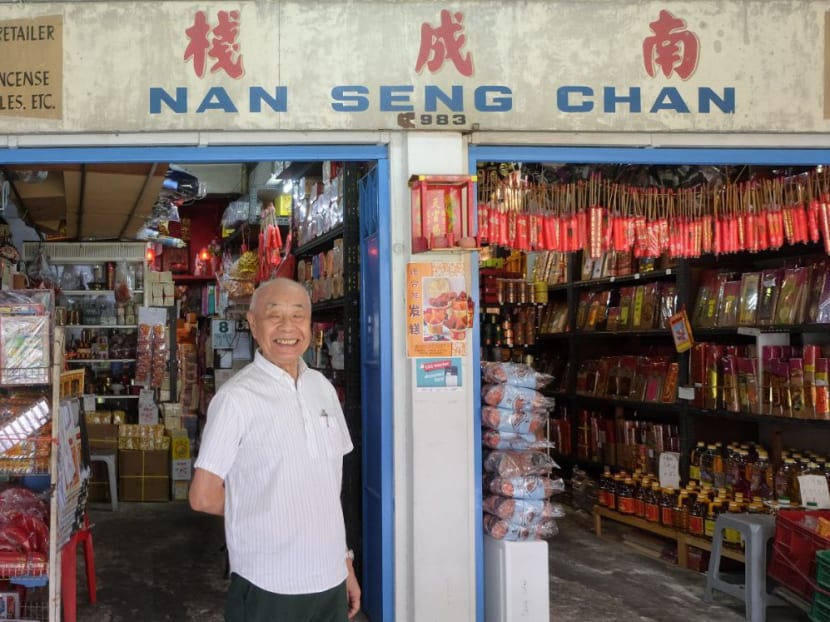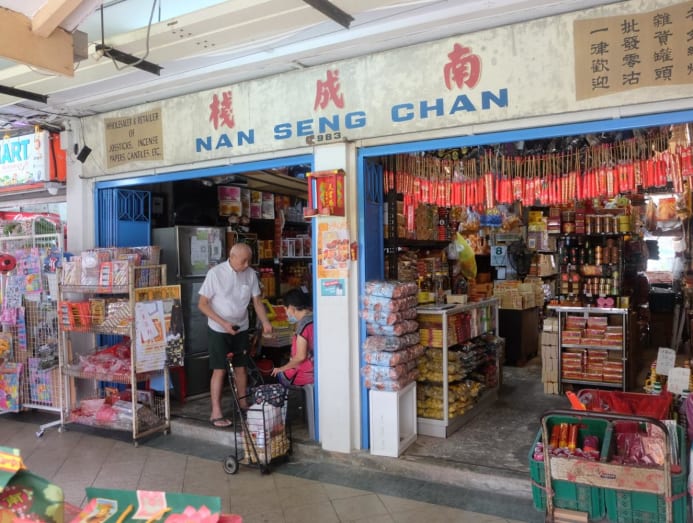Meet the 80-year-old joss paper seller who fled a revolution in China for a life in Singapore
Nan Seng Chan's Ng Cheng Hun. (Photo: Joyce Yang)
The hungry ghost festival is marked in red on Nan Seng Chan’s calendar. Every year, the 55-year-old shop stocks up on joss sticks, incense papers and candles at least 30 days before the seventh lunar month starts.
Once the goods arrive, hard work ensues. Ng Cheng Hun, the shop’s 80-year-old founder, starts work as early as 4am. The residents of Macpherson had asked that he synced his hours with the wet market vendors.
Even in “off-peak” seasons, the shop opens for business by 7.30am without fail. It runs like clockwork daily, only stopping to catch its breath during the lunar new year break. That gives Ng a grand total of three rest days every year.
Asked if the past decades had taken a toll on him, he smiled and said: “The darkest time of my life has passed”.
ENDURING THE GREAT CHINESE FAMINE
Ng was born in Fujian, China, and his journey to Singapore started with a passport and one US dollar.
Ng Cheng Hun with a regular customer at Nan Seng Chan. (Photo: Joyce Yang)
In the 1950s, Mao Zedong’s newly formed People’s Republic of China was underway. Ng’s father took off with his entire family and left him, the eldest son, behind to guard the family altar and care for his grandmother.
“Being left behind in the raging Cultural Revolution was gruelling,” he recalled. “Life was brutal. For three years, my grandmother and I had nothing to eat.”
The duo survived on a measly diet of potatoes, and their substitute for vegetables was cow and pig feed. As far as supplies went, the authorities would issue each family a large barrel. It contained one bowl of rice grains and the rest was all water.
In school, Ng attended physical education classes on an empty stomach. After dismissal, his journey home took hours on foot. He knew only two things for sure – that he could reunite with his grandmother in the evening, and she would have saved him the entire bowl of rice.
“Every evening, she sat and waited for my shadow to emerge around the corner. I had rice while she survived mostly on water,” Ng teared up as he recalled his grandmother’s sacrifice. “Grandmothers usually dote on the eldest grandson. She loved me the most, yet she insisted that I left her.”
His grandmother’s single mindedness came on the back of China’s political turmoil. People were dying of hunger, and she feared they would suffer a similar fate if they remained sitting ducks. It took everything in her to make him flee communist China, and even more for the 17-year-old to oblige. The eye-watering price he made for freedom pains him to this day. She was 98 when he left her.
A CHINESE REFUGEE IN A JOSS STICK FACTORY
Freedom swimmers – this was what people called Chinese refugees who left mainland China by swimming to Hong Kong. Ng’s route laid beneath a bridge that connected Gongbei Port in Zhuhai, China, and Macau. The 20 minutes he spent crawling in secrecy through the mud would change his life forever.
In 1959, Ng arrived in Hong Kong with nothing to his name, save for a passport the government had issued along with a single US dollar and a local contact he was given.
“My friend in China said that if I couldn’t find asylum in Hong Kong, I could try my luck there,” Ng explained. “The man was the boss of a joss stick business, and turned out to be my benefactor.” Today, Nan Seng Chan still carries the latter’s brand of joss sticks – a symbol of Ng’s gratitude.
Leung Wing Hing joss sticks from the factory that took Ng in. (Photo: Joyce Yang)
In exchange for food and shelter, Ng laboured at his boss’ joss stick factory. Because the workshop was thick with dust and smoke, and Ng’s health could not take the dismal air quality, he was put in charge of packing the finished goods. From afar, he watched as the lively workers embraced the painstaking process with great joy. “I was very surprised,” he said. “I remember thinking that they are making immense contributions to our trade. They are doing what others won’t.”
Two years later, Ng sailed to Singapore with hopes for a family reunion. Instead, reality could not be further from it. Ng’s father was infuriated to see his eldest son and condemned him for abandoning his duties. He demanded that Ng return to China.
That he had survived the unthinkable and come this far only to be rejected by his family was crushing. For a time, the homeless 20-year-old slept in the back of lorries at the former Thong Chai Medical Institution along Eu Tong Sen Street. “At 4 to 5am, when people left for work and started their engines, I would wake up with a start and hop off.”
It was not long before Ng was on the road again. This time, he travelled to Kulai in Johor, Malaysia to master the art of candle-making, which wasn’t a huge departure from his trade in Hong Kong. He learned to carve dragons and phoenixes – an auspicious duo in Chinese culture – onto wax. Once again, the world of joss sticks, incense papers and candles threw him a lifeline in his darkest hours.
FROM DESKER ROAD TO MACPHERSON
In 1967, Ng returned to Singapore and started working at a shop along Desker Road. Around this time, he was also matchmade with a lady who later became the mother of his five children. Asked where they went on their first date, Ng laughed and said: “We just stayed in the shop. Back then, having fun was not on our minds.”
Ng tending to an elderly customer at his shop. (Photo: Joyce Yang)
But the boat was rocked again. His boss, who made a habit of gambling the shop’s takings away, did not pay Ng a single salary. However, he did agree to compensate Ng in kind.
With a wife and an inventory of goods in tow, he made a salesman of himself. “I would go from one provision store to another, jot down what they needed, and deliver them the next day.”
Soon, business was brisk enough for Ng to own a warehouse. Nan Seng Chan was born, with every character on its signboard telling a different story. Nan is derived from Nan’an, Ng’s hometown in China; Seng from his namesake; and Chan, which means repository in Chinese. They started distributing to stores across the island, but not even two years later, life flung Ng yet another curveball.
“The waters were up to our waists,” Ng told me of a massive flood that wiped out his entire store in the second year. “All my incense papers were ruined. I thought we would be destroyed if this happened every year, so I dared not stay put.”
Ng’s search for a new place led him to 87 Circuit Road, where Nan Seng Chan now resides. Then, the landlord frequently clashed with her old tenant and was desperate to have Ng take over the unit. She named a price of S$5,000, including its doors, grills, and hardware – all of which withstood the test of time and still serve their functions today.
Nan Seng Chan’s back gate was recently given a fresh coat of paint. (Photo: Joyce Yang)
“I told her I do not have S$5,000, but she told me never mind. I can pay her back when I have money,” Ng said, recounting the kindness that gave his wife, firstborn, and business a shelter in 1969.
Their tiny family of three soon grew to seven, and the horseshoe ceiling hook where his babies’ cradles once suspended is an artefact within the 55-year-old shop. The old residents would take turns rocking them to sleep, and have practically watched them grow up. “It’s been over 50 years in the blink of an eye,” he said.
A 21ST CENTURY TAKE ON TRADITION
Nan Seng Chan carries both handmade and mass-produced goods, though Ng is clearly partial to the former. Wistfully, he told me that handmade goods are all about a craftsman’s techniques and evoke a different feeling entirely. According to him, their mass-produced counterparts look similar but do not compare in quality. “Artisans are few and far between. The old ones have retired, and youngsters aren’t drawn to our trade,” he conceded.
Will the tradition of burning offerings cease with this generation, too? Ng does not think so. To him, these rituals are steeped in thousands of years of history. They have been passed down from one generation to another, and therefore will continue to be. While the way Nan Seng Chan conducts business will be affected, he acknowledged, traditions will not.
The business’ numbers share his sentiments. Nan Seng Chan sees an increasing number of young customers who, while well-meaning, do not know how to go about honouring the traditions they were raised with.
How will they tell the difference across Hokkien, Teochew, Hakka, Cantonese and Hainanese joss papers? How will they discern between “clothes” for ancestors and “robes” for the gods? On top of the seventh lunar month, how will they keep up with Qing Ming, Zhong Yuan, and Dong Zhi festivals?
They won’t. However, this does not stop them from wanting to pay respects to their parents the only way they know how. Ng’s daughter has convinced him that youngsters rarely know what to pluck off the shelves, and Nan Seng Chan offers ready-made packages for budgets ranging from S$5 to S$50. Once, a customer even requested one worth S$500.
“He asked us to burn the offerings to his late father on his behalf,” Ng explained. “He lives in the CBD, so I figure it’s because there is no compound to do so. Perhaps he worries about offending his neighbours.”
When Ng told me that customers living abroad make similar requests, I wondered aloud if paying respects on another person’s behalf feels hollow. He explained that sincerity looks like different things across individuals and there is an understanding, in their trade, that these rituals transcend geographical locations.
“You can pay respects to ancestors, gods, or the departed from wherever you are. It does not matter where they are born or where they die.”
Look up Nan Seng Chan on Google and you’ll find its e-commerce platform (it's Nam Seng Chan on their website), which Ng’s daughter created right before COVID-19. Initially, Ng had his reservations about going online, but decided to give it a shot during the pandemic when the government was handing out subsidies for the businesses. To her daughter, even if the website did not take off, it would help immortalise the history of their family business on the Internet.
Really, it seems improbable that Nan Seng Chan exists at all. Not because it appears to be a sunset trade, but because Ng was dealt an impossible hand in life. There were so many lows that threatened to seal his fate, but rock bottom became the foundation on which he rebuilt his life each time.
Sixty-three years ago, Ng was a wee teenager on all fours in the dirt between two nations – his grandmother on one shore and the promise of freedom on another. Today, he has five children, six grandchildren, and a business to call his own. Asked about the long way he had come, Ng was quiet for a while.
Then he said: “I feel proud, even though I am not very successful. I started with a Chinese passport and US$1 and built a life in Singapore from nothing. I consider myself extremely blessed.”
This article was originally published on ChannelNewsAsia. Its inclusion on this website is solely for education purposes.

.jpg?itok=Bp2DkaLz)
.jpg?itok=dau7WQ7p)


.jpg?itok=hEykAW0b)

No comments
Share your thoughts! Tell us your name and class for a gift (: